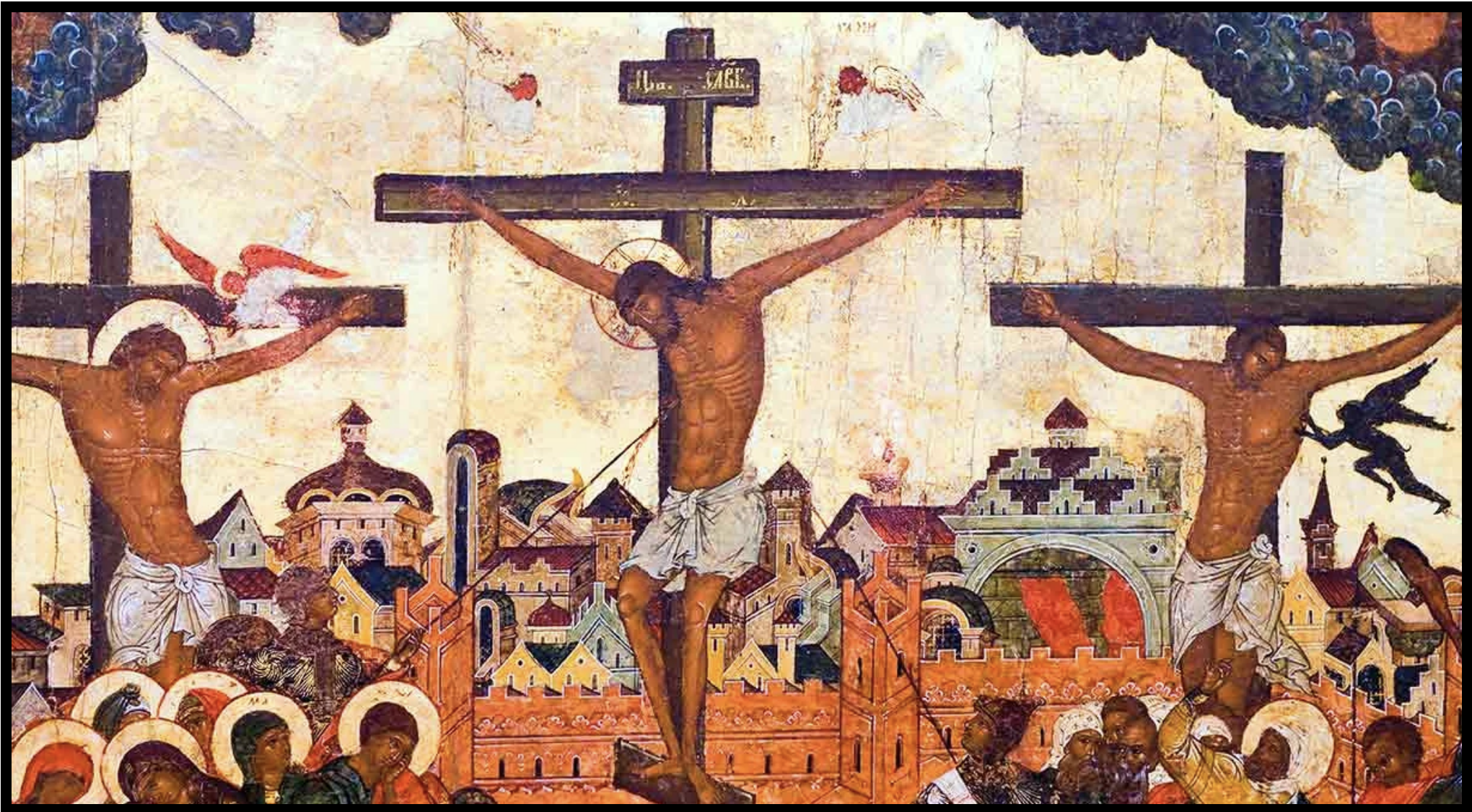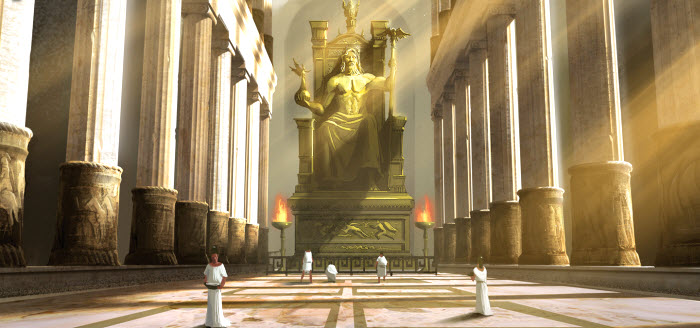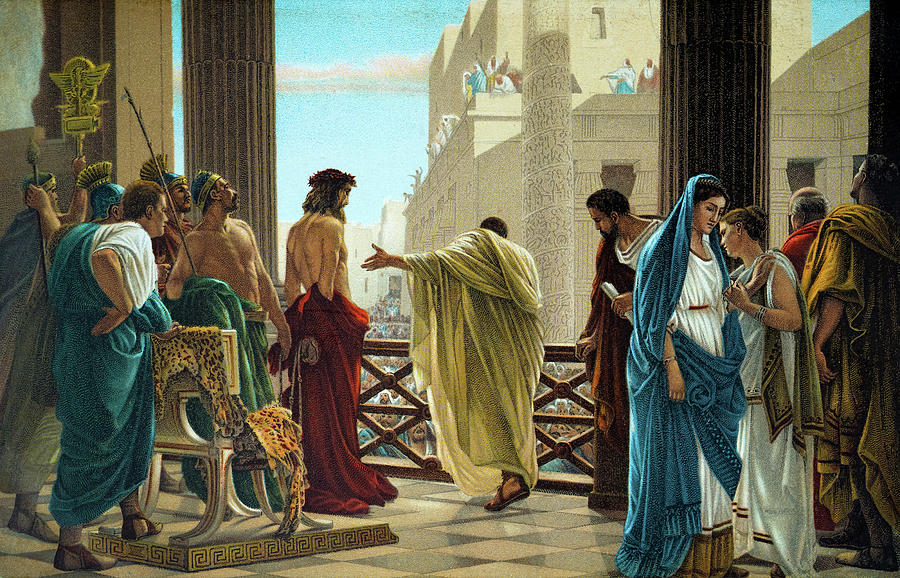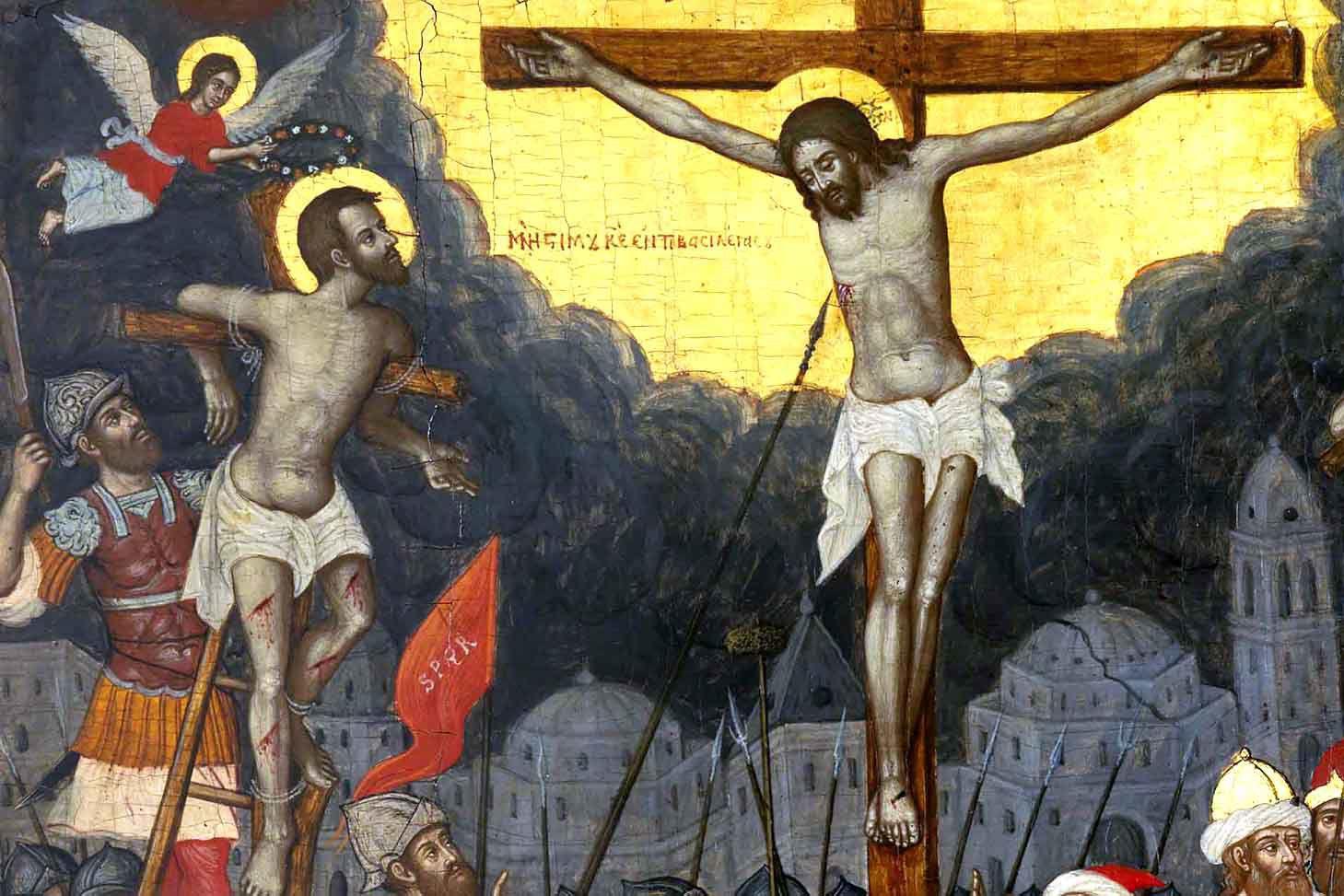
John 20:1-10 (Matins)
Hebrews 4:14-5:6
Mark 8:34-9:1
The Throne of God
He said to them, "Whoever desires to come after Me,
let him deny himself, and take up his cross, and follow Me."
(Mk 8:34)

Several times a year, the whole Orthodox Church reflects together upon the Cross.
We call to mind the Empress St. Helena
excavating and sifting through rubble
together with St. Makarios, the Patriarch of Jerusalem.
They searched tirelessly discovering,
beneath the pavement of the ruined shrine
to Venus-Aphrodite,
three cross-beams buried under its costly tiled floors and pavement.
Nearby,
another pagan shrine
of the early second century
had been built by the Emperor Hadrian
—
the enormous Temple of Zeus-Jupiter.
Across all is writ large questions of power, of rule, and of governance
—
foremost leaders sifting through the ruin of past reigns and faded glory.
Surely,
a comparison is urged upon us
as we contemplate
soaring white temples with enormous gold statues,
on one side,
and three humble cross-beams,
on the other.
Questions arise naturally.
Where is the Throne of God?
What is the nature of our God's power?
And, finally,
what is the Cross,
at once
both a symbol of servile humiliation
and
of victory over the world?
What can all this mean?
The answer goes to the heart of the greatest question,
"Who do you say that I AM?"

Where is the Throne of God?
What might it look like?
There was a pavement on which the King of the Universe stood,
where He was proclaimed to be king.
"Behold, the Man!" Pilate exclaimed.
The Roman authority set a plaque:
"JESUS OF NAZARETH. KING OF THE JEWS"
One hundred years later,
the Romans built a Temple to Venus-Aphrodite
upon that same spot.
She was the goddess of sexual love
(from which we get our word aphrodisiac.)
Not far from there,
was built a temple to
the pagan king of the universe, Zeus-Jupiter.
Unlike the place where Jesus' plaque was hung
—
outside the city,
near the town dump (we might say)
—
the Temple of Zeus-Jupiter was located centrally,
on the Temple Mount.
It was
a vast edifice dwarfing the Parthenon on the Acropolis in Athens.
At the end of a long, center colonnade
sat the king of the pagan gods.
His enthroned figure soared perhaps 100' above the pavement
(as archaeological remains suggest.)
During the early fourth century,
when St. Helena and St. Makarios
excavated beneath Venus' Temple,
a set of
three, rough hewn cross-beams were found
—
not 100' high or long,
not surrounded by colonnades,
not
preceded by a long, dramatic pavement,
but rather lowly, humble,
scaled to the sadness of human life.
Now, imagine yourself today
(this is not hard for us to do)
on an Island where the traditions of Christianity
have been mostly lost.
You are charged to establish a church.
What would you do?
What would you build?
How might you stir the imaginations of the people?
Which building might they claim as their own,
the one they
identify with?
Which would draw them to gather on Sunday mornings,
and where they would want to be
baptized,
married,
and honor their dead?
Would it be
the dazzling white temple with a 100' gold statue
or
rather a place encircled around
three humble cross-beams?
In this,
we get a sense of St. Paul's situation as he stood in
in the midst of a pagan lifeworld
surrounded by white temples
and
said
to the people,
|
The cross is foolishness .... to those who are perishing.
(1 Cor 1:18)
|
Let us turn, for a moment, away from the earthly view
and
consider God's perspective.
Those who love God,
who think on Him daily,
realize
that Jesus' Passion was not suffered over the space of a few days.
Jesus' passion began at His mortal birth.
For God had poured out His incommensurable Glory,
His Almighty Power,
His Cosmically-expansive Being ....
he poured outa this Super-abundance
into the horrible straits of our narrow humanity.
He emptied Himself.
He entered
the smothering prison-house of our (relatively) puny capacities and impotent powers.
St. Paul uses the Greek
κένοσις
(kénosis):
αλλα εαυτον εκένωσεν
/
alla eauton ekénosen
Nay, rather He emptied Himself ....
(Phil 2:7)
|
He freely submitted Himself to this confinement
—
an act of self-denial beyond our comprehension.
What a difference between two extremes!
They cannot even be comprehended in terms of each other!
Consider the the toy of a pagan temple
and
the three cross-beams discovered beneath its pavement.
While we might insist on distinctions
in order to
assert our superiority over each other,
God is not impressed by such distinctions.
He is is fundamentally Other.
"For My thoughts are not your thoughts,
Nor are your ways My ways," says the Lord.
(Isa 55:8)
|
While we all share mortal life .... with ants and microbes,
God alone is life,
the One Who alone creates and animates
with that magic we call being.
Yet,
He has singled us out to possess a high dignity.
For He ordained His human creatures
to be the dwelling place
and
earthly expression of His Son.
Actually,
we must say indwelling or interdwelling place,
for the Lord Jesus, our Creator,
Who became human in a stunning act of self-deprecation.
You understand:
this is not God Who .... "Oh my goodness! Look Whom we put in prison!"
He became human.
Beginning with St. Ignatius of Antioch (d. 107),
the Fathers have passed down a defining principle of theology:
communicatio idiomatum
—
a two-way communication of properties.
God truly took on human nature,
else we could not use phrases like the "sufferings of Christ."
(How could God suffer?!)
And
the Divine faculties of humans were restored, at least in principle,
else we could not use concepts like "adoption by God" or "birthright to Heaven" .... we
could not undertake the
journey of theosis,
where we become transformed into a truly Divine being,
someone who could be called God's daughter or God's son.
The Risen Christ insists on this unity between the human and the Divine.
He insists on the dignity of the human body
which is also victor over death.
He is no ghost:
He insists on the reality of His wounds.
"Put your hand in them," he exhorts the Apostle Thomas.
He sits at table with people
and
breaks bread:
And He said to them, "Why are you troubled? And why do doubts arise in your hearts?
Behold My hands and My feet, that it is I Myself. Handle Me and see, for a spirit
does not have flesh and bones as you see I have."
(Lu 24:39)
|
He has stooped down to gritty earth
that we might be raised to Highest Heaven.
In this
the human figure of the Risen Christ,
a Person of the Holy Trinity,
has touched even the heart
(so to speak)
of the Three-Person God
with human properties ....
albeit purified and sanctified human properties.
That is,
the Holy Trinity,
Whom we think of as being incomprehensible shares kinship with us.
The Lord Jesus repeatedly teaches us to take hold of this high dignity and
Divine identity.
In this morning's Gospel lesson,
He asks,
For what will it profit a man if he gains the whole world, and
loses his own soul? Or what will a man give in exchange for his soul?
(Mk 8:36-37)
|
.... the dying world, the rotting world, versus the immortal soul.
Who would trade their Heavenly title in exchange for temporary material pleasures?
"Here! Here is some cotton candy, and there's a little fair over there.
All I need for admission is your birthright to Heaven and your noble title and character."
Now, here truly is the devil's bargain.
Who would do this?!
The world is not worthy to be mentioned in the same company.
Of course, Jesus understands the irony:
that
most people have it precisely backwards,
grasping for more and more fleshly pleasures
while paying no heed to the state of their souls.
Whether God entered
human history
born into a palace furnished with purple and gold
or
into a stable of mud and dung-stained straw
are distinctions of great importance to us,
but not to Him.
Of importance to Him is one thing:
the state of your soul and mine.
Everything depends upon that ....
today and finally.
☦
It is ironic that Pilate should call Jesus "King of the Jews,"
for
in this he gets several things wrong.
First,
he has already been told that Jesus' Kingdom is not of this world.
Second,
if Jesus were to have an earthly reign,
it certainly would not be over the Jews
—
a term singling out Mesopotamian religion.
For that is precisely
the point of Jesus' being sent into the world:
to save the Lost Tribes of Israel from the "Abomination of Desolation"
as it is stated in the Book of Daniel, which is set in the Babylonian court.
Such is the chaos of our broken world
—
a world of many confusions,
of false impressions,
and
mistaken decisions.
Nonetheless,
in this dust cloud
there is one golden thread between humans and the Divine.
It is immune from the world's decay and moral fog.
Neither is this connection distant.
It is urgently near,
able to cause waves of inspiration
to sweep over us and down into our bones.
It is the golden thread between God and our feeling, searching, sentient souls.
Then what could be in the way?!
What might cause us to become separated from God,
to become alienated .... even permanently?
The separation comes
from our fixation upon the world,
becoming spiritually deadened by the pursuit of its pleasures,
allotting to God nothing
—
none of our time,
none of our attention,
and not caring to learn about Him or His ways.
How many people can honestly say they have even read God's letters,
which we call the Bible .... much less pore over them,
day by day
and
week by week,
with a mind of sincere searching?
Saint Jerome,
the fifth-century Father
and
one of the Four Great Doctors of the Roman Catholic Church,
wrote that "ignorance of Scripture is ignorance of Christ!"
Now, who would wish to say they ignorant of Jesus Christ?
I might add that St. Jerome did not mince words.
Yet who could ever match the flintiest prophet of them all,
Jesus of Nazareth?
The Master said bluntly,
For whoever desires to save his life will lose it, but whoever
loses his life for My sake and the gospel's will save it.
(Mk 8:35)
|
Let us get this straight:
if you (or I) should become preoccupied with worldly life,
pursuing the pleasures that catch your eye,
you will lose your Heavenly birthright.
But if you should empty yourself,
becoming filled instead with Divine life,
you will be saved.
Anyone who has visited the Hermitage
website
knows, that I am most blessed among men.
For I live in the midst of this self-emptying.
I see it every day,
week in and week out,
witnessing
two ladies
eighty-years-old,
who have poured out their lives for Jesus' sake
and
for the good news of Heaven's Kingdom ....
nearly all their lives.
They are bent over from long decades of humble and servile labors.
They offer pure hearts to God each day in prayer.
They have completely denied themselves the pleasures most people take for granted.
Yet,
they would never mention any of this.
It is my honor as their chaplain,
watching them
who always seek the lowliest place.
But woe is me!
For I have scandalized them yet again!
But say these things I must,
for beyond the gates of the Hermitage
is a dust cloud of lost lives wandering in all the wrong directions.
So many have sought refuge and solace
in,
of all things,
the very animal pleasures that continually alienate them from God,
even rendering God invisible to them.
How shall we find our way through this deadly fog?
How shall we escape these deadly tempests that threaten to sink our little boats
like the faithless Disciples?
Jesus has set a beacon upon a high hill for everyone to see,
to guide us away from the rocky and ruinous coast.
Is there anyone alive or dead who has not seen it?
It is a great Compass driven deep in the earth of our broken world
raised even to Highest Heaven.
And
it is traced with the Sacred Form of the One Who is fully God and fully man.
On the Compass are written the four points:
East, West, North, and South,
which spell
the Greek word ADAM
—
the Old Adam He has redeemed,
and
the New Adam Whom He is.
He has also etched this Compass upon our souls.
And He commands us today,
|
"Pick up this cross and follow me!"
|
.... a Divine command
we must never forget.
For at the end of our lives and at the end of all time,
we shall see three crosses.
On the left hand of our Self-Emptied God,
we shall see a man named Gestas.
We know him,
for he is us,
at least most of us.
His name means, "the things I have done."
We have done so many things
directed by our giddy egos.
We are a prideful people:
that is ego life.
And many of us,
on that account,
cannot be corrected.
When we are corrected,
we are apt to blame others.
How many of us have said,
pointing to the brokenness of our world,
"How could God have let this happen?"
This is Gestas' question:
how could Jesus the Christ let this happen to him (tempting God)?
He says,

|
"If You are the Christ, save .... us."
(Lu 23:39)
|
I wonder how many people think about this as they passively expect
Jesus to sweep them into Heaven.
Like so many, many people,
he is the sort of man who never paid God any heed,
who knows nothing of the Scriptures nor of God's ways,
yet expects to be swept into Heaven
on account of God's mercy and power.
All his life,
he has ignored the most important "pleasure" of all,
which is intimate relationship with God:
not ego-driven life,
not pleasure-driven life,
but
God-driven life.
And such a man,
the Scriptures plainly record,
Jesus ignores.
On the right hand of God is Dismas.
His name means "to the west."
He has reached the "sunset" of life.
His little "play" has come to its final act and scene.
All the things he has done and said are .... as they are.
And he looks into God's face,
beholding the Incarnation of Truth.
And he sees himself as he really is,
for the first time.
His soul cuts through his personal fog with searing clarity,
and His heart breaks.
His humiliation is a consuming fire.
He would kneel before the Christ if only he could, but nails pin him to a cross-beam.
And He begs to be forgiven.
And God forgives Him.
For
this true sincerity,
this fire,
has burned off the dross that had tarnished
the golden thread.
And from the Cross,
the King of the Universe turns to Him
and
says,
|
"Assuredly, I say to you, today you will be with Me in Paradise."
(Lu 23:43)
|
The Cross.
It is the Throne of God.
It is the Judgment Seat.
It is the Everlasting Sign of Jesus' thirty-three year passion.
For all of us,
it is a way of life,
a path of purification,
and
the unerring door to eternal life.
He implores us to pick up this cross and to follow Him.
Do not fail to accept this most important invitation.
For He throws to us a life preserver
and
the only chance we have for victory over death.
In the Name of the Father and of the Son and of the Holy Ghost. Amen.



